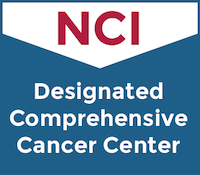Shared Content Block:
Styles -- custom quote
CU Cancer Center Undergoes NCI Renewal Process
In May 2021, representatives from the National Cancer Institute visited the CU Cancer Center virtually as part of a renewal process that happens every five years. To receive renewed funding, NCI-designated Cancer Centers must undergo a rigorous evaluation process conducted by nationally recognized peer reviewers. Preparations include a year of data collection and grant writing, followed by verbal presentations and questioning from reviewers during the site visit. In the highly competitive process, reviewers evaluate cancer centers for basic and translational science programs, clinical and population-based research, cancer education, community outreach, and the center’s clinical growth and translation of research to patient care.

Every five years, through our renewal process, we prove that we are pioneers in research, show our commitment to reducing health disparities, and demonstrate how our care is impacting the lives of Coloradans facing a cancer diagnosis. We received a strong review after the NCI visit in May, and we are optimistic our funding will be renewed for the next five years.
Richard Schulick, MD, director of the CU Cancer Center
On March 31, 2022, the National Cancer Institute (NCI) officially renewed the CU Cancer Center’s “comprehensive” designation with a strong rating, the best ever received at the CU Cancer Center.
→ National Cancer Institute Renews CU Cancer Center’s ‘Comprehensive’ Designation
What the National Cancer Institute Designation Means
The CU Cancer Center’s classification represents strength in research and more options for patients.
The National Cancer Institute (NCI) has recognized 71 cancer centers around the country as NCI-designated cancer centers. These institutions meet rigorous standards for transdisciplinary, state-of-the-art research focused on developing new and better approaches to preventing, diagnosing, and treating cancer.
The University of Colorado Cancer Center became an NCI-designated cancer center in 1988. In 1997 it had the further distinction of being named one of 52 NCI Comprehensive Cancer Centers. The ‘comprehensive’ designation recognizes the center’s strengths in basic, translational, clinical, and population science research, as well as leadership and resources devoted to community outreach and engagement and cancer research training and education. The CU Cancer Center is the only comprehensive cancer center headquartered in and serving the entire state of Colorado.
Through the Cancer Center Support Grant, the NCI provides grant funding to its designated cancer centers to support shared resources for research, provide funds to advance scientific goals, and foster projects that draw investigators from different disciplines together. The investigator-members of the CU Cancer Center currently hold more than 600 externally-funded grants and contracts worth more than $86 million in total cost support. Investigators at the CU Cancer Center focus on interdisciplinary research in four programs:
- Molecular and Cellular Oncology: Researchers work on providing insights into gene expression regulation and its deregulation in cancer, the cellular response to genomic insults, the molecular structure of cancer-relevant proteins, and new signaling transduction processes driving tumor growth.
- Tumor Host Interactions: The program seeks to understand how the environment of tissues and cancers influences the development of cancers, the aggressiveness of these cancers, their responses to therapies, and outcomes for patients. Precancers and cancers exhibit many interactions with a person’s immune system, blood vessels, and other cell types, and the program seeks to understand these dependencies with the ultimate goal of developing therapies that target or leverage these host cells to mediate cancer elimination.
- Developmental Therapeutics: The goal of the Developmental Therapeutics program is to reduce the cancer burden through the integration of the processes of discovery, development, and delivery of new anticancer agents. Through this program, new development and delivery of new anticancer therapies are provided for patients.
- Cancer Prevention and Control: This research has led to advancements in primary and clinical preventive services, statewide policies, and improved cancer survivorship. Past accomplishments from Cancer Prevention and Control investigators include studying promising agents in preclinical studies; identifying breast cancer risk factors in Hispanic women; developing and operating the Colorado Colorectal Screening Program; making advancements in the understanding of obesity and breast cancer; and affecting statewide cancer prevention and control policies.
The CU Cancer Center also is working toward advancements in cancer research, prevention, and patient care, as well as community outreach and education. Some of the center’s most recent initiatives include:
- Researching the causes of, and prevention and treatment of, breast cancer among young women.
- Developing a mechanistic understanding of metabolism-targeted therapies for acute myeloid leukemia (AML).
- Exploring how aging impacts cancer initiation, progression, therapeutic outcomes, and patient survivorship.